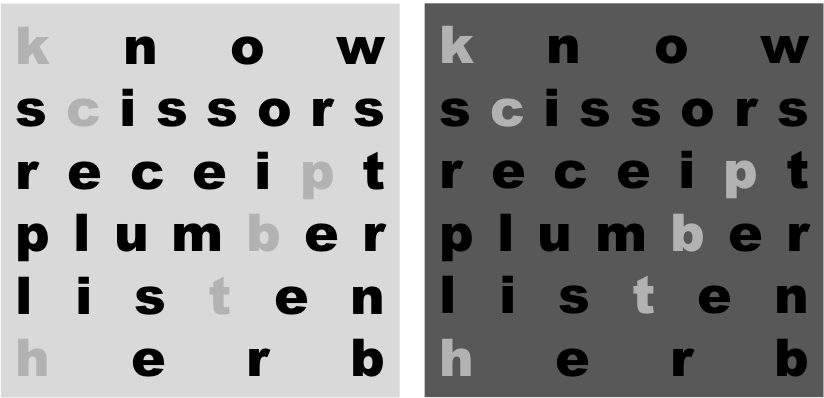Have you ever been surprised by a word's spelling in English? It probably happens all of the time. You either see a word first and try to pronounce it by saying all the letters, only to be misunderstood. Or, you learn a word's correct pronunciation but then spell it wrong. Don't worry! Everyone has to memorize these rules, including native English speakers.
Here is a list of silent letters and the words you will find them hiding inside:
- Silent "b" : debt / plumber / doubt
- Silent "c" : muscle / scene / scissors / Connecticut (The middle "c" is silent.)
- Silent "ch" : yacht
- Silent "d" : Wednesday / handkerchief
- Silent "g" : sign / foreign
- Silent "h" : herb / hour
- Silent "k" : knowledge / know / knack / knock / knife
- Silent "l" : talk / walk / half / folk / could / should / would
- Silent "n" : column / condemn
- Silent "p" : receipt / psychology / cupboard / Campbell
- Silent "s" : isle / island
- Silent "t" : listen / mortgage / fasten / Christmas
- Silent "z" : rendezvous

You cannot trust English spelling. Here are a few reasons why English spelling does not always "match" its pronunciation:
- English borrows a lot of words from other languages, and sometimes we keep the pronunciation of the original word. The word "hour" comes from French. French speakers do not pronounce the "h" at the beginning of words, and so when we borrowed this word from French, we also borrowed their pronunciation. However, we DO pronounce other "h" sounds in borrowed words such as "hospital" and "hungry."
- Sometimes a word is made from a combination of two words. When this happens, one of the letters in the middle of the new word is often silent. For example, the the "h" in "shepherd" is silent, but the reason we spell it with an "h" is because it is a blend of "sheep" and "herdsman". This also happens with the letter "t" in "Christmas," which is a blend of "Christ" and "mass."
- The passage of time also influences how we pronounce a word. Words beginning with "k" come from Old English, and before the 17th century, English speakers pronounced the "k" at the beginning of words like "knee" (k-nee). As English evolved, the pronunciation changed but the spelling did not.
You can learn more about silent letters from this great video by Joanne Rudling at How To Spell.

I wanted to title this blog post "Silence of the Letters." Would you have understood my reference to this famous American movie? The movie title also has a silent letter. Can you find it?
If you are a MyOvient Plus member, you can ask questions or leave comments below. Click here to learn more about MyOvient Membership Options.

 About MyOvient
About MyOvient Contact Us
Contact Us


